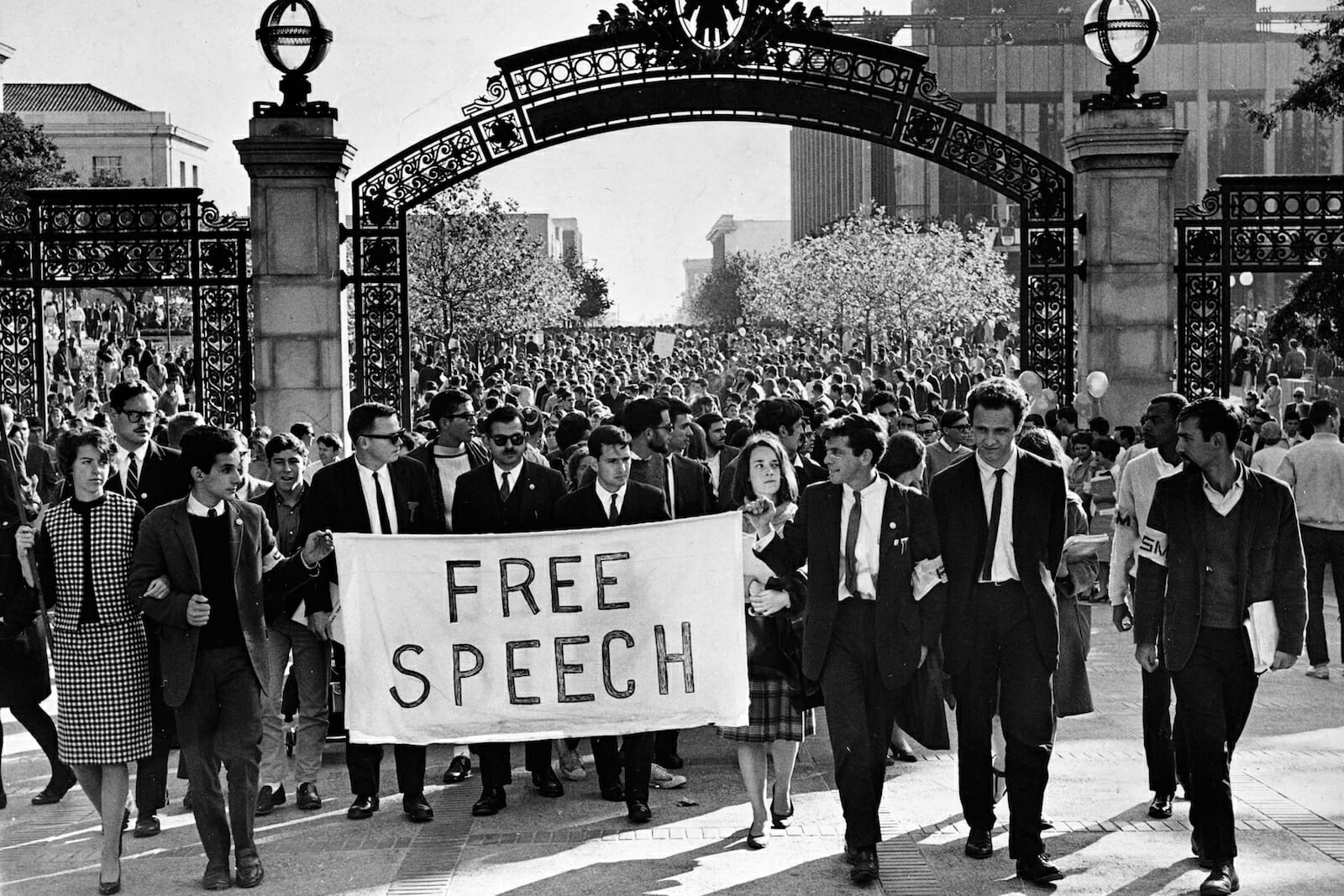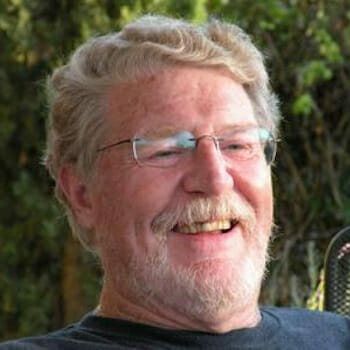
Free Speech Movement: The Musical
History plays present their own particular challenges. On one hand, the story is driven by the sequence of events in the real world. On the other, the drama has to engage an audience. The twain rarely meet. But Joan Holden’s FSM, under the able direction of Erin Merritt, with music and lyrics by Bruce Barthol and Daniel Savio, pulls off the still more daunting job of creating an evening of theater that entertains both those for whom the events include their own life stories and those for whom it is ancient history.
Subtitled “A play with music that changed America,” FSM covers a four month period in the fall of 1964 when students took on the University of California at Berkeley over the right to speak and organize on campus. There is a little bit of tongue-in-cheek in the title, and Holden wisely does not try to turn the “Battle of Berkeley” into the Second Coming. But, at the same time, she understands that something unique happened in those fall days when virtually the entire student body came together to confront the powerful and wealthy Board of Regents, and win. That victory has echoed down the years, helping to propel the anti-war movement, the women’s movement, and battles around racism, South Africa, and Gay liberation.
Commissioned by Stagebridge, an Oakland-based theater company of older adults, the play was written with the 50th anniversary of the FSM in mind. It was performed before packed audiences during a weeklong celebration on the Berkeley campus.
Many in those audiences had taken part in the events the play portrayed, which made them both enthusiasts and critics. And, Lord, those FSMers can quibble and debate, just like they did a half-century ago.
The arc of the story runs from the initial arrest of Jack Weinberg in Sproul Plaza, and the subsequent sit-in around the police car in which he was being held, to the key vote in the Academic Senate that finally broke the back of the University administration. Those four months were enormously complex, in part because the FSM itself was such a heterogeneous collection of ideas, tactics and political beliefs, ranging from Communists to conservative Republicans. Nor is it taken out of context. Its antecedents in the civil rights movement are abundantly clear, and the depiction of the sexual politics among the activists presages the arrival of Woman’s Liberation groups a few years later. The complexity of the differences within the various groups—students, faculty, and administration—and their varying certainties and ambivalence, all come into play as Holden refuses to reduce her characters (with very few exceptions: J.Edgar Hoover, for example) to one dimensional mouthpieces for an Idea. The play does an admirable job of reflecting that mosaic without losing sight of the dramatic narrative. As someone who took part in those events 50 years ago, I was continually surprised at how accurately the play managed to reflect the highs and lows of the struggle.
But FSM is hardly a didactic documentary. Holden, a long-time playwright for the San Francisco Mime Troupe, brings lots of energy, humor, and action to the stage, and Barthol’s and Savio’s music is engaging, even moving. When the students are packed into Sproul Hall awaiting arrest, they sing “Carry Us Away,” a song that mirrors both their determination not to give in and their fear at what is to come. It was one of the play’s most powerful moments.
FSM moves back and forth between the events of 1964 and current interviews with veterans. Older actors sit and talk about what their characters did after 1964, while the young actors who portray their younger selves stand silently behind them. The cast of 19 plays multiple roles—43, to be exact—and there always seems to be a crowd of protestors (fraternity hecklers, angry citizens, etc.) on stage.
Director Erin Merritt choreographs a visually arresting montage that keeps the action clear as actors segue from character to character. Stagebridge actors (Abe Bernstein, Patricia Long Davis, Charmaine Hitchcox, Lynne Hollander, Bill Liebman, Merle Nadlin and Miyoko Sakatani) capably portrayed many of the older characters, with Bay Area notables Dan Hiatt (as the grown-up “small town boy” and a clearly conflicted Clark Kerr) and the SF Mime Troupe’s Ed Holmes filling out the senior tier of the intergenerational cast. Brady Morales-Woolery’s portrayal of one of the FSM’s major leaders—or spokesman, as the FSMers repeatedly insist—Mario Savio, sometimes borders on the eerie. Morales-Woolery gets Savio’s body language and speaking cadence down almost perfectly (yes, yes, quibble, quibble). Heather Gordon is particularly effective as the sorority girl turned activist, and the cohort of younger actors, all professionals (Lucas Hattan, Andrew Humann, Danielle Gray, Jeremy Kahn, Damion Matthews, Brandon Mears, Adrienne Walters and the SF Mime Troupe’s Lisa Hori-Garcia), ably embodied the passion of the characters “workin’ in the movement.”
So, is it history or theater? Both. The question is: can it play Peoria? Probably not, but FSM is bigger, more entertaining, instructive and engaging, than just a play whipped up for a 50th anniversary. On its own, the production is dramatic and fun, the music catchy, and Karla Hargrave’s simple but engaging sets make it the kind of low-cost production that would do well in university towns.
FSM is not just nostalgia or, in the end, a play about a specific historical event. It is about how people come to commit themselves to something, despite the pressures of everyday life. It is not about activists, but how people become activists. The song “Workin’ in the Movement” picks up the excitement of that commitment, but also the strain it puts on people’s personal lives. But the decision to come together and resist is a formula for how to build a better world. That particular message is bound by neither time nor geography.
As the director notes in her introduction to the play, “The promise of 1964 remains to be fulfilled 50 years later.” Indeed, it does. Free speech is still under attack. Racism, inequality, sexism, homophobia, and war plague the nation. But FSM presents a hopeful solution: convince people to commit themselves, pack the plazas, and take the bastards on.
